Boost Agent Morale with These 6 Strategies
Let’s face it — no one contacts your contact center to tell the person who answers the phone, text, or chat to tell your organization that they love your brand, service, or product. Most interactions that contact center agents have daily are to solve a problem or issue, adjust a payment, or ask a clarifying question.
When customer interactions are the heartbeat of business operations, one crucial factor often takes center stage – agent morale. The well-being, satisfaction, and motivation of your frontline staff play a pivotal role in shaping the customer experience. According to Harvard Business Review, engaged employees deliver better customer experiences. Said another way, there is no better prediction of the type of customer interactions that will occur between your customers and agents than whether your agents are motivated, satisfied, and feel supported. All of this leads to better agent morale. Let’s take a deeper look at the factors that influence employee engagement and morale.
Definition of Agent Morale
Agent morale refers to the overall satisfaction, motivation, and mental well-being of customer service representatives in a contact center. It’s the collective emotional state of the team, encompassing their engagement, enthusiasm, and commitment to their roles.
Importance of Agent Morale in Contact Centers
The significance of agent morale cannot be overstated. As noted above, a high level of morale among your customer service representatives directly translates to a positive customer experience. When agents are motivated and satisfied, they are more likely to deliver exceptional service, handle challenging situations effectively, and foster positive customer interactions.
Factors that Influence Agent Morale
Several factors contribute to the ebb and flow of agent morale. These can include workload, workplace environment, relationships with colleagues and superiors, and the level of support provided. Agent morale can also be positively or negatively impacted by flexibility in an agent’s work environment, such as enabling agents to work from home (WFH) or accommodating agent’s scheduling preferences. This might include allowing an agent to always leave at 2 pm to do school pick up or letting an agent come in at 10 am to care for an aging parent. Agent morale can also be impacted by inconsistent feedback on performance. Identifying and addressing all of the factors that can impact agent engagement is essential for maintaining positive morale.
Impact of Low Agent Morale on Customer Experience
Low agent morale can have a cascading effect on the overall customer experience. Unhappy agents may struggle to maintain a positive tone during interactions, whether those are via phone, text, SMS, or even social media. In the case of social media, there are many well-documented and viral examples of an agent providing poor customer service that then leads to a domino effect for the company’s brand. Customer dissatisfaction can not only impact brand loyalty, but it can also result in increased agent turnover rates, negatively impacting team dynamics and continuity of service.
Strategies for Improving Job Satisfaction and Agent Morale
With the clear link between agent morale and positive or negative customer experiences, leaders in contact centers must implement various strategies to enhance job satisfaction and engagement. Let’s take a look at six ways a manager or supervisor can positively impact agent morale.
1. Provide Consistent Feedback on Performance via Quality Management (QM)
Although we can all agree that receiving negative feedback on performance is difficult for even the most thick-skinned among us, giving this kind of feedback is better than no feedback at all. Research supports this statement. In a recent Harvard Business Review blog, results from a survey of 2,479 people were asked, “What has helped your career more, positive or negative feedback?” Some of the results included:
- 70% agreed with the statement, “My performance and possibilities for success in my career would have increased substantially if I had been given more feedback.”
- 96% believed, “Negative (redirecting) feedback, if delivered appropriately, is effective at improving performance.”
- And, respondents were found 11 times more likely to say they preferred negative over positive feedback.
One way to provide feedback is via conducting consistent quality management (QM) reviews. This is when a set of statistically relevant interactions are analyzed for things such as:
- Proper introduction and closing of the interaction, such as using the customer’s first name and asking if their issue or problem was resolved before closing out the text or chat session
- Acknowledging the customer’s issue and displaying empathy. This can be as simple as replying to an upset customer with words such as “I understand how frustrating this must be for you.”
- Taking care to solve the customer’s inquiry through the first contact, also known as first contact resolution (FCR).
- If a problem cannot be resolved in the customer’s first interaction, make sure the customer understands the next steps and follow up.
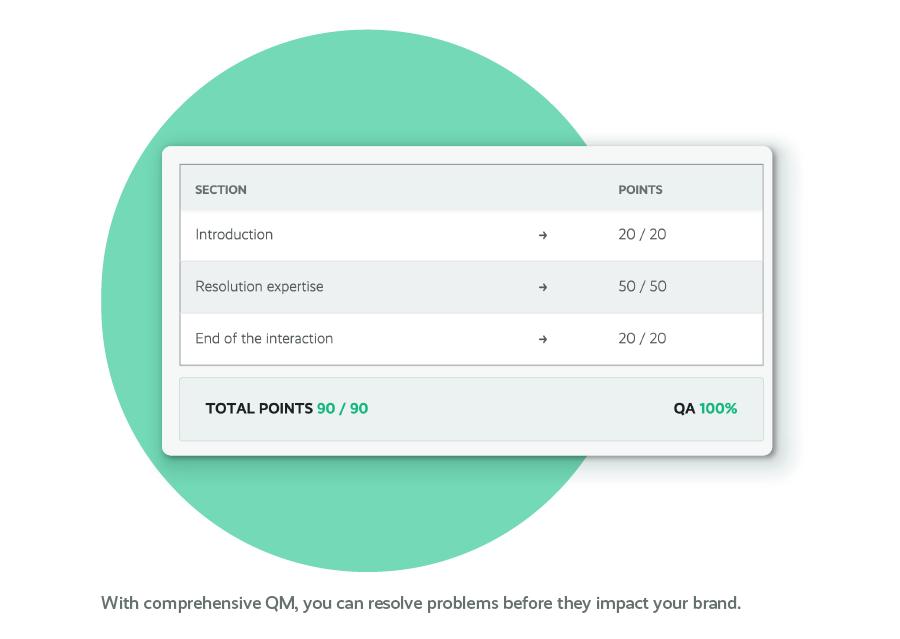
Unfortunately, when contact centers get overwhelmed with a high volume of interactions, QM can be the first thing that is tossed aside due to the length of time it may take. This is where something like AutoQA (AQA), may be the solution as it can automate the feedback process and make it easier for contact center leaders to provide consistent feedback since it is less time-consuming than traditional QM.
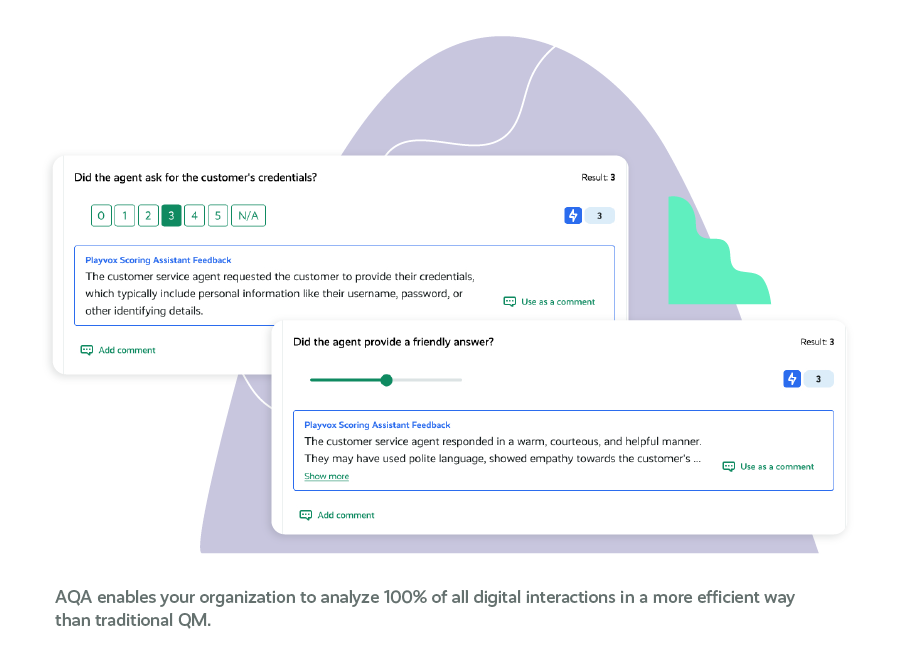
2. Provide Coaching and Training Opportunities
Investing in continuous training not only enhances the skills of agents but also boosts their confidence and job satisfaction. Regular training programs can keep agents up-to-date with industry trends and improve their problem-solving capabilities. Along with training, it is important to provide timely coaching to your agents. Having a solution that not only provides suggestions on improving performance, along with a way for agents to acknowledge feedback, is one of the best ways you can make coaching effective.
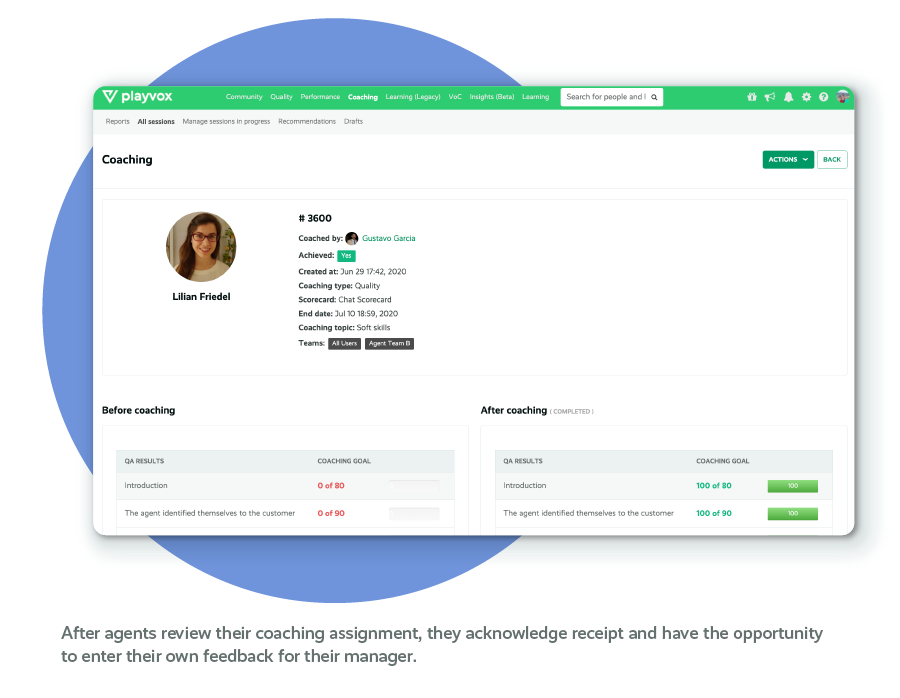
3. Offer Career Advancement Opportunities for Agents
Creating pathways for career progression within the organization motivates agents to excel in their roles. Knowing that their efforts can lead to promotions or new opportunities encourages a sense of purpose and dedication among team members.
As part of this, make sure you give agents specific ways they can advance through your organization. Many leaders refer to this as an Individual Development Plan (IDP). An IDP includes things like skills needed, courses required, proficiency expected, and other measurable and relevant ways an agent can move up at your company. Having a checklist of sorts for promotions and/or job changes provides agents with a clear path and has a positive impact on agent morale.
4. Recognize and Reward Agents for Their Work
Acknowledging the efforts of agents through regular recognition programs or awards can significantly impact agent morale. Publicly praising achievements, both big and small, reinforces a positive work culture and motivates others to strive for excellence.
One fun way to provide recognition is via a gamification solution. With something like this in place, you can give out badges that relate to company goals in a public forum. Receiving public recognition for a job well done inspires higher performance and builds motivation and agent morale.
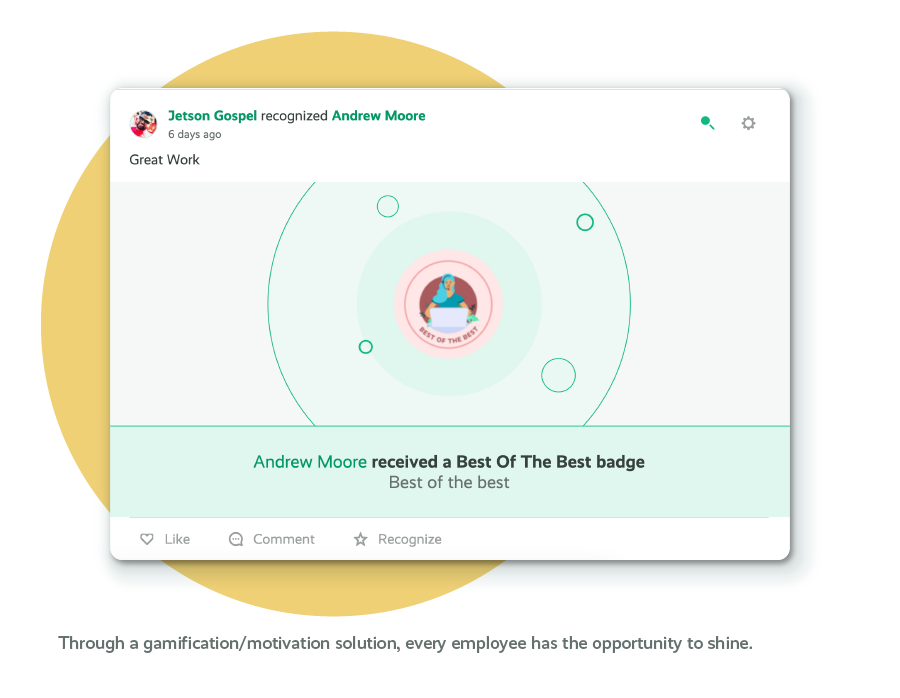
5. Implement Flexible Scheduling Options
Balancing work commitments with personal life is crucial for agent well-being. Offering flexible scheduling options enables agents to manage their time effectively, reducing stress and contributing to a healthier work-life balance.
As you look at Workforce Management (WFM) solutions, make sure to choose one that can easily account for things like:
- Omnichannel scheduling: Many WFM systems in the market were built for a phone-based call center, rather than an omnichannel contact center where agents interact with customers via email, chat, voice, SMS, and social media. Ensure whatever solution you choose lets you schedule for the many channels in your contact center so you have coverage when you most need it – across all of your channels.
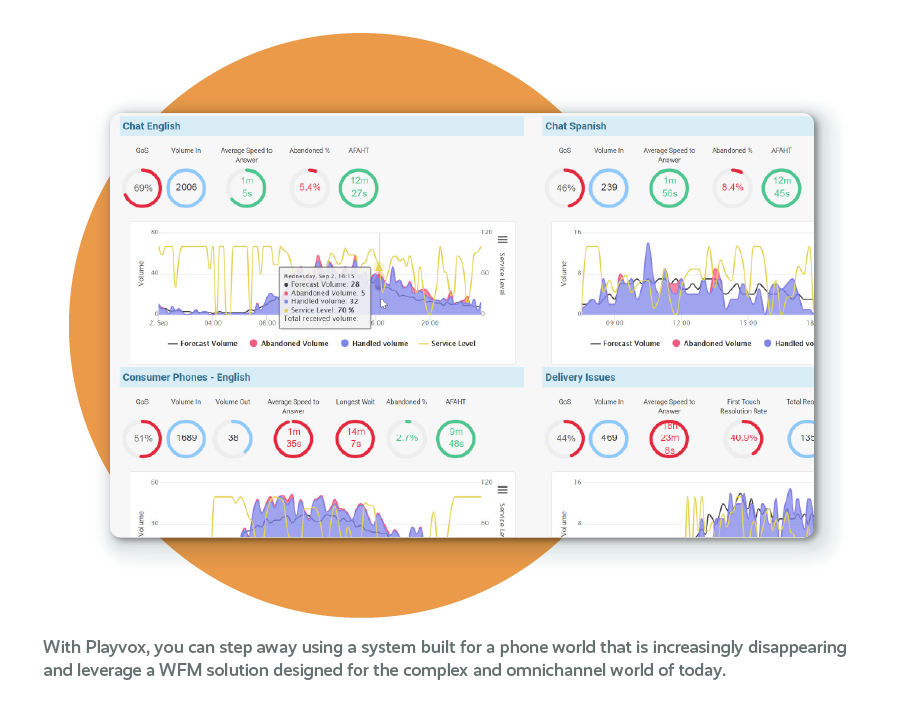
- Multi-step scheduling: As bots and Artificial Intelligence (AI) have automated many simple transactions, agents often are faced with complex inquiries that may require departments outside the contact center such as billing or membership services. Traditional WFM systems often struggle with accommodating these types of interactions as they were originally built for a single phone call, rather than multi-step requirements that are much more common today. If your WFM system cannot schedule for this type of complexity, service level agreements (SLAs) may be missed, causing agents to be overwhelmed and dissatisfied.
6. Offer Wellness Programs to Support Physical and Mental Well-being
Wellness initiatives, including mental health support and physical wellness programs, demonstrate an organization’s commitment to the overall well-being of its agents. This, in turn, positively influences morale and job satisfaction.
As you think about the wellness programs you want to offer, they don’t always need to cost money. While gym memberships, reduced fees for a therapist, or gift cards for a much-desired item are nice, employees also appreciate no-cost or low-cost wellness-oriented offerings such as an afternoon or day off, extra time to attend an in-house yoga or meditation workshop, or discounts on meals. As you think about the types of wellness programs you’d like to put in place, make sure you ask your agents for ideas. There is no better way to improve agent morale than actively seeking and acting on feedback from your agent population.
Improving Agent Morale – A Final Note
In the dynamic landscape of contact centers, the emotional well-being and satisfaction of customer service representatives are integral to success. By understanding the intricate connection between agent morale and customer experience, contact center managers can implement a holistic approach to improve agent engagement, motivation, and job satisfaction.
Remember, happy agents equal happy customers. By fostering a positive work environment, providing ongoing support, and recognizing the contributions of your team, you can create a contact center where agents thrive, leading to a more satisfying customer experience overall. As you embark on the journey to boost agent morale, keep in mind that the investment in your team’s well-being is an investment that will pay dividends now and in the future. For more ideas on ways you can motivate your agents, check out this article.







